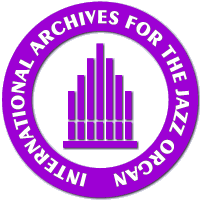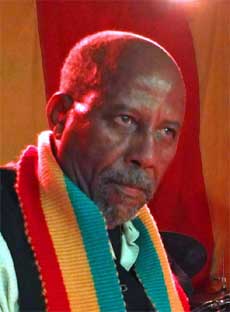
The Jazz Organ Scene
Ethiopia

|
Hailu Mergia
Hailu (* 1946 in the Showa province) moved to Addis Abeba in his youth. He had grown up on traditional Oromo, Amhara and Tigrinya songbook melodies, and taught himself the accordion at age 14. His mastering of the accordion, as well as the keyboard and his talent for "re-purposing folk songs into funkier modern melodies", defined his contribution to popular music in Ethiopia. In the 1970s, Hailu was the keyboardist in the Walias Band, a jazz and funk band with a hard polyrhythmic funk sound influenced by western artists like King Curtis, Junior Walker and Maceo Parker. In the period, it was harder for working bands in the region to make a living, after Mengistu's Derg government imposed breaks to Addis Abeba's nightlife, but music was still being regularly recorded, and cassettes were the typical release format, given they were easy to duplicate and distribute. Walias Band had a 10-year long residency at Addis's Hilton hotel in this period.
Due to the Derg dictatorship, censorship was often a problem for the area's musicians, but Hailu acknowledged one way around censorship was to only create instrumentals. He later noted: "When you sing or write lyrics you have to support the government, and if you don't do that then you have a problem." Ethiopian music was typically led by a vocalist, and fewer than five instrumental albums were released during the 'golden age' of Addis' music, one of which was one of Hailu's landmark albums with the Walias Band, Tche Belew (1977). As a side project, Mergia joined the Dhalak Band around this period and recorded the cassette-only Wede Harer Guzo (1978) with them, a jazz-infused album with a dominance of improvisation. Hailu's organ work for the band was one of the Walias Band's key characteristics, but during a 1980s tour of the United States, Hailu and several other members decided to stay in the US, effectively ending the band's career, although their legacy in Ethiopia was strong by this point, especially via their 1977 instrumental "Muziqawi Silt." It was only several years after moving to the US that Hailu recorded a new album, Hailu Mergia & His Classical Instrument, in 1985, during which point he was playing with the Zula Band. Hailu recorded the album alone in a small studio belonging to an acquaintance that Hailu met at Howard University, where he had begun studying music. He stopped performing in 1991 and opened a restaurant. Since 1998 Hailu has worked as a taxi driver while continuing to record his music. from Wikipedia |
| contact: | |
| homepage: |
|
Shemonmuanaye Awesome Tapes From Africa ATFA006 recorded 1985 |
Hailu Mergia, organ, keyboards |
|
Tche Belew Awesome Tapes From Africa ATFA012 recorded 1977 |
Hailu Mergia, organ Abebe Kassa, alto sax Moges Habte, sax, flute Yohannes Tekola, trumpet Mahmmud Aman, guitar Melaku Gabrie, bass guitar Girma Beyene, piano Temare Haregu, drums Mulatu Astatke, xylophone, congas |
|
Wede Harer Guzo Awesome Tapes From Africa ATFA021 recorded 1978 in Addis Abeba/Ethiopia |
Hailu Mergia, organ Tilaye Gebre, sax Shimels Beyene, trumpet Dawit Kassa, guitar Dawit Yifru, piano Abera Feyissa, bass Tesfaye Tessema, drums Muluken Melesse, vocals Rida Ibrahim, vocals |
|
Lala Belu Awesome Tapes From Africa ATFA028 recorded 1985 |
Hailu Mergia, keyboards, accordion, melodica Mike Majkowski, bass Tony Buck, drums |
|
Asnakech Awesome Tapes From Africa ATFA031 originally issued 1975 on cassette recorded 1975 in Addis Abeba/Ethiopia |
Hailu Mergia, keyboards, accordion, melodica Mike Majkowski, bass Tony Buck, drums |
|
Tezeta Awesome Tapes From Africa ATFA041 

|
Hailu Mergia, keyboards The Walias |
 |
n/a |
| n/a |
|
You can watch the video on the YouTube site by clicking on the corresponding picture. For more videos search YouTube |
|

|

|

|

|
Back
If you don't see the left hand menu,
please go back to the homepage.
Back to the homepage